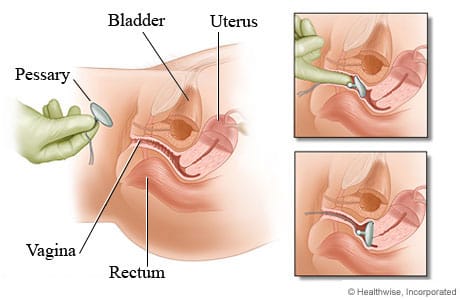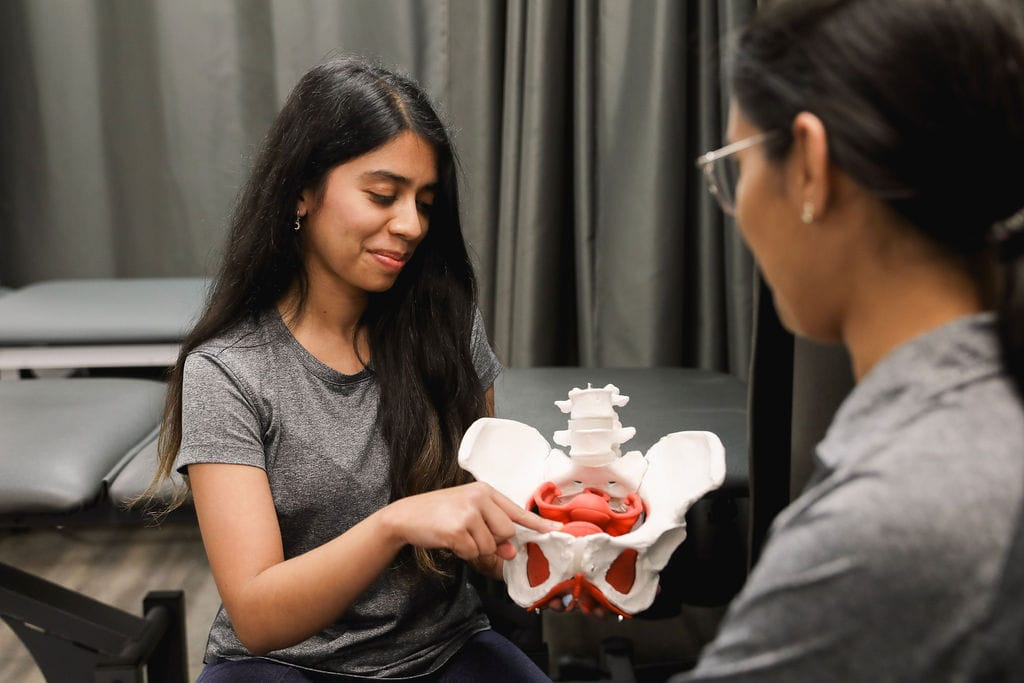There are a lot of unknowns when going into labour and delivery. Whether it’s your first, second, or third child, every birth is very different, and daunting in its way. Some women hope to have a vaginal delivery, while others schedule or have emergency C-sections. Both forms of delivery are viable options however they can have different effects on your body postpartum. A cesarean section (C-section) can be life-saving for both the baby and mom. A common misconception is that a C-section is somehow “easier” but that is far from the truth. A C-section is a major surgery, that not only affects your abdominal muscles but also your pelvic floor. In this blog post, we will explore what C-sections are, their impact on the pelvic floor, and the benefits of pelvic floor physiotherapy for women who have had C-sections.
What is a C-section?
A C-section is a surgical procedure that involves delivering a baby through an incision made in the mother’s abdomen and uterus. It is usually performed either if the mother schedules a C-section, which may be for a variety of reasons, or in the case of an emergency. This may be done to save and protect the mother and baby. Some reasons for a C-section include a large baby, breech position, multiple pregnancies, maternal health conditions such as high blood pressure (preeclampsia), or labor not progressing as expected (dilation plateauing).
What impact does a C-Section have on the pelvic floor?
Many people assume that a C-section does not have any impact on the pelvic floor because the baby does not pass through the vagina. However, the pelvic floor can still be affected during a C-section. During the procedure, the surgeon may need to move the bladder and intestines to access the uterus, which can cause temporary weakness and stretching of the pelvic floor muscles. The stretching can also occur due to the weight of the baby pushing down on the pelvic floor during pregnancy. The procedure can also impact the nerves supplying the bladder and bowel, thereby reducing or completely removing your urge to pee. This altered sensation can improve over time, but may sometimes linger for years postpartum. In some cases, the sensation never comes back.
After the C-section, some women may experience pain and discomfort in the pelvic area, which can be exacerbated by activities such as lifting and carrying their newborn. This can lead to muscle tension and tightness, which can cause further issues down the line.
What are the benefits of pelvic floor physiotherapy after a C-section?
Pelvic floor physiotherapy is a specialized form of physical therapy that focuses on strengthening the pelvic floor muscles, improving their function and flexibility, and treating any pain or discomfort in the pelvic area. It can be very beneficial for women who have had a C-section, as it can help to address any issues that may have arisen due to the surgery.

How can healing and recovery be improved after a C-Section?
Pelvic floor physiotherapy can help to speed up the healing process after a C-section. It can help to reduce pain and swelling in the pelvic area, improve circulation, and promote tissue regeneration. It can also help to prevent the formation of scar tissue, which can cause discomfort and pain in the pelvic area. Keloid scarring is a type of scarring at the C section where the tissue raises and forms adhesions. This can be painful in some cases or uncomfortable and can impact sensation in the region.
- Address bladder and bowel issues
After a C-section, some women may experience bladder and bowel issues such as incontinence, urgency, or difficulty emptying their bladder or bowel. This may be a product of the nerves being impacted during the surgery or other factors. Pelvic floor physiotherapy can help to address these issues by strengthening the pelvic floor muscles and improving their function. It can also help to retrain the bladder and bowel to function properly and reduce incontinence.
- Improve sexual function
Many women may experience a decrease in sexual function after a C-section due to pain and discomfort in the pelvic area. This may be due to feelings of pelvic heaviness, perineum discomfort, or scar tissue. Pelvic floor physiotherapy can help to address these issues by reducing pain and discomfort and improving the function of the pelvic floor muscles. This can lead to an improvement in sexual function and overall sexual satisfaction.
Seeing a pelvic therapist post-C-section can also get you back to activities you love doing! This can include running, weight lifting, etc. There is no timeline for how quickly you should be recovering. Our bodies take time to heal postpartum. Your body is not broken, but working with a pelvic therapist can help you feel more like yourself again.
Where can I find a pelvic health physiotherapist in Mississauga?
We have 8 locations with pelvic health physiotherapists to help you.
- Pelvic Health Physiotherapy Etobicoke – Triangle Physiotherapy Etobicoke
- Oakville Pelvic Health – Triangle Physiotherapy Oakville
- Pelvic Health Physiotherapy North York – Triangle Physiotherapy North York
- Mississauga Pelvic Health – Triangle Physiotherapy Mississauga
- Downtown Pelvic Health – Triangle Physiotherapy King West
- Uptown Toronto Pelvic Health – Triangle Physiotherapy Lawrence Park
- Pelvic Physiotherapy Downtown Toronto – Triangle Physiotherapy Queens Quay
- Mississauga Pelvic Health – Triangle Physiotherapy Erin Mills
Seeing a pelvic floor physiotherapist after a C-section can be crucial for recovery and regaining strength. If you’re looking for specialized care, consider physiotherapy in Etobicoke, Oakville, North York, Toronto, Lawrence Park, Queens Quay, Erin Mills, Mississauga, or Liberty Village. Skilled physiotherapists in these locations can provide personalized post-C-section care to support your healing journey.
Triangle Physiotherapy in Mississauga is a full-service clinic that offers specialized services like Pelvic Health Physiotherapy. Our pelvic health physiotherapists are trained professionals who, apart from being experts in their field, are also empathetic individuals who understand the sensitive nature of the conditions that make people seek pelvic health physiotherapy.
Tell me more about your Mississauga Pelvic Health physiotherapists.

Our Mississauga Pelvic Health physiotherapists have training in the field of pelvic health physiotherapy and are committed to providing the best care to the community in Mississauga, be it new moms, women with prolapse or incontinence issues, pessary fittings, labour and delivery support, and more. We also have a pelvic health physiotherapist who is trained to help children. Our pelvic health physiotherapists are also able to help men with their pelvic health issues.
What type of conditions can a pelvic floor physiotherapist treat?
Some of the conditions treated by our Mississauga Pelvic Health physiotherapists are:
- Incontinence (urinary and fecal)
- Pelvic organ prolapse and pessary fittings
- Constipation
- Diastasis recti
- Vaginismus
- Pelvic pain
- Pelvic girdle pain during pregnancy and postpartum)
- Coccydynia (tailbone pain)
- Pudendal neuralgia
- Interstitial cystitis
- Female and Male Sexual dysfunction
- Prostatitis
- Rectal pain and dysfunction
- Irritable bowel syndrome
- Anal incontinence
- Anal fissures and fistulas
- Anal neuralgia
- Rectal prolapse
I just gave birth recently. How soon should I see a pelvic health physiotherapist
The pelvic floor muscles may get stretched or damaged during delivery, whether by C-Section or vaginal. This may cause issues of the pelvic floor that manifest as urinary or fecal incontinence, urinary urgency or frequency, pain during sexual activity, pelvic organ prolapse, pelvic pain, lower back pain, diastasis recti, or scar pain. Many of these issues can be addresed by pelvic health physiotherapy, however, our pelvic physiotherapists in Mississauga recommend waiting at least six weeks after delivery to allow the body time to heal from childbirth.
Can I speak to a pelvic health physiotherapist in Mississauga prior to booking a consultation?
We can certainly connect you with the best pelvic floor physiotherapist in Mississauga that can answer any questions you may have. Click here to book a discovery call.
Where can I find a pelvic health physiotherapist in Mississauga?
We have 8 locations with pelvic health physiotherapists to help you.
- Pelvic Health Physiotherapy Etobicoke – Triangle Physiotherapy Etobicoke
- Oakville Pelvic Health – Triangle Physiotherapy Oakville
- Pelvic Health Physiotherapy North York – Triangle Physiotherapy North York
- Mississauga Pelvic Health – Triangle Physiotherapy Mississauga
- Downtown Pelvic Health – Triangle Physiotherapy King West
- Uptown Toronto Pelvic Health – Triangle Physiotherapy Lawrence Park
- Pelvic Physiotherapy Downtown Toronto – Triangle Physiotherapy Queens Quay
- Mississauga Pelvic Health – Triangle Physiotherapy Erin Mills
“Finding the right pelvic health physiotherapist is crucial for effective treatment and recovery. Triangle Physiotherapy offers expert care across the GTA, including Physiotherapy in Etobicoke, Oakville, North York, Toronto, Lawrence Park, Queens Quay, Erin Mills, Mississauga, and Liberty Village. Our skilled physiotherapists specialize in pelvic health, providing personalized treatment plans to help you achieve the best possible outcomes.”
You should consider seeing a physiotherapist when you’re experiencing pain or discomfort, or have mobility issues that affect your daily activities and quality of life. Physiotherapists are healthcare professionals trained to diagnose and treat a wide range of musculoskeletal and movement-related conditions.

Here are some situations in which you might want to consult a physiotherapist:
- Pain and Discomfort: If you’re experiencing persistent pain, whether it’s in your joints, muscles, or any part of your body, a physiotherapist can help identify the root cause and provide treatment to alleviate the pain.
- Injury Recovery: If you’ve suffered an injury, such as a sprain, strain, fracture, or sports-related injury, a physiotherapist can guide you through a rehabilitation program to regain strength, flexibility, and function.
- Mobility Issues: If you’re having trouble moving, walking, or performing daily activities due to stiffness or limited range of motion in your joints, a physiotherapist can develop exercises and techniques to improve your mobility.
- Post-Surgery Rehabilitation: After surgeries, such as joint replacements or orthopedic procedures, a physiotherapist can help you recover faster and regain normal function through targeted exercises and therapies.
- Chronic Conditions: Physiotherapy can help manage chronic conditions like arthritis, fibromyalgia, or chronic back pain by improving muscle strength, joint flexibility, and overall functional capacity.
- Postural Problems: If you have poor posture that’s leading to discomfort or pain, a physiotherapist can assess your posture and provide guidance on how to improve it.
- Neurological Conditions: Physiotherapists also work with individuals who have neurological conditions such as stroke, multiple sclerosis, or Parkinson’s disease to improve movement, balance, and coordination.
- Preventive Care: Even if you’re not currently experiencing pain, a physiotherapist can provide guidance on exercises and habits that can help prevent future injuries and maintain overall musculoskeletal health.
- Sports Performance Enhancement: Athletes can benefit from physiotherapy to improve their performance, prevent injuries, and receive specialized training techniques.
- Pregnancy and Postpartum Care: Physiotherapists can assist pregnant individuals with managing pain and discomfort associated with pregnancy and can provide exercises to help with postpartum recovery.
It’s important to note that physiotherapists work closely with other healthcare professionals, and they will often collaborate to provide you with comprehensive care. If you’re unsure whether seeing a physiotherapist is appropriate for your situation, consider consulting your primary care physician or a medical professional for guidance.
At Physiotherapy Oakville, our team works hand-in-hand with doctors, specialists, and other healthcare providers to ensure you receive the most comprehensive and effective treatment. Scientific studies have shown that a multidisciplinary approach to care can significantly improve patient outcomes. By joining Physiotherapy Oakville, you benefit from a coordinated and collaborative healthcare experience that addresses all aspects of your condition, providing you with a well-rounded and practical path to recovery.
How do I book an appointment with a physiotherapist near me?
Click HERE to book an appointment with a physiotherapist or chiropractor at one of our eight locations.
- Physiotherapy Etobicoke – Triangle Physiotherapy Etobicoke
- Oakville Physiotherapy Clinic – Triangle Physiotherapy Oakville
- Physiotherapy North York – Triangle Physiotherapy North York
- Mississauga Physiotherapy Clinics – Triangle Physiotherapy Mississauga
- Downtown Physiotherapy Clinics – Triangle Physiotherapy King West
- Uptown Physiotherapy Clinics – Triangle Physiotherapy Lawrence Park
- Physiotherapy Clinic Downtown Toronto – Triangle Physiotherapy Queens Quay
- Physiotherapy Clinics Mississauga – Triangle Physiotherapy Erin Mills
“Knowing when to see a physiotherapist can make a significant difference in your recovery and overall well-being. Triangle Physiotherapy offers expert services across the GTA, including Physiotherapy in Etobicoke, Oakville, North York, Toronto, Lawrence Park, Queens Quay, Erin Mills, Mississauga, and Liberty Village. Our experienced team is here to help you address any physical concerns early on and guide you toward optimal health.”
Our physiotherapy center in Mississauga is located at 4188 Living Arts Drive, Unit 3, Mississauga L5B0H7. The closest intersection is Living Arts Drive and Burnhamthorpe Road, in the Square One Mall area.
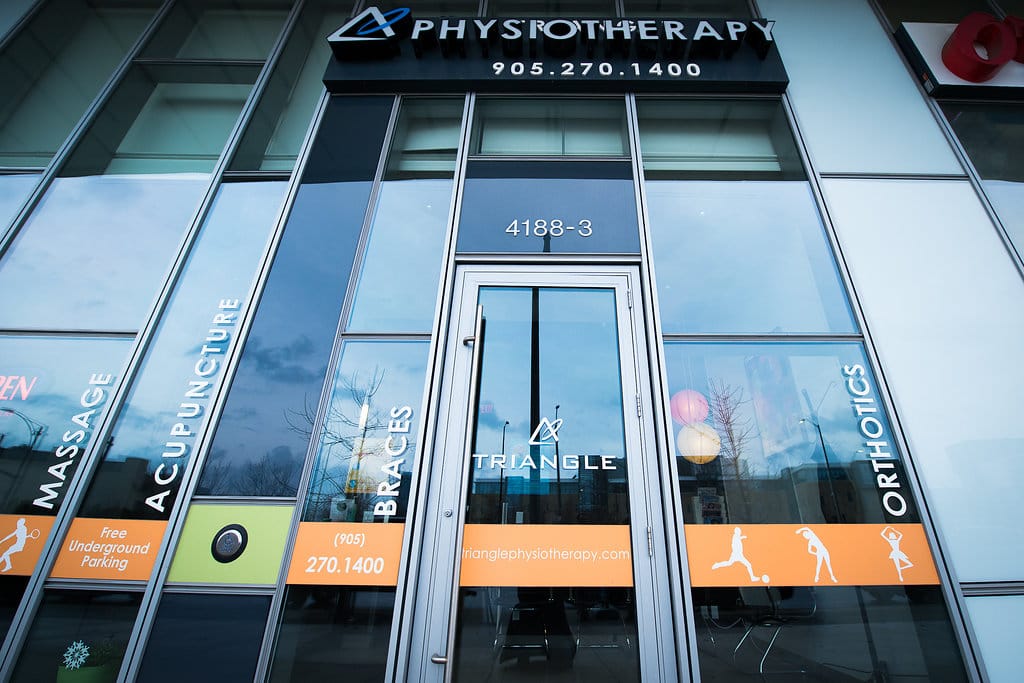
My health is very important to me so I would like to choose the best physiotherapy clinic near me. I have heard great things about you. What makes you the best physiotherapy clinic in Mississauga?
Our patients have told us many times that we offer the best physiotherapy service in Mississauga because from the second they step inside our physio clinic in Mississauga until the end of every session, our physiotherapists at our Mississauga clinic provide them with a one-on-one quality service they deserve.
I went to a physiotherapy clinic near me which I was told was the best physiotherapy clinic in Mississauga but I found out the physiotherapist who was treating me was not registered. Are all the physiotherapists at your Mississauga clinic registered?
Yes, all the physiotherapists at our Mississauga clinic are registered. We go through a rigorous vetting process for applicants when we hire our professionals, as we want to provide the best expertise and service to our patients.
I recently moved to Mississauga and am in search of a physiotherapist near me who could provide me with excellent care like my previous physiotherapist. Which physiotherapist in Mississauga would you recommend I see?
Our physiotherapists in Mississauga are all registered, highly qualified and will provide you with quality care that will exceed your expectations. We have all their profiles on our website for your review. You may also call us and we can discuss your condition further so we may recommend the physiotherapist at our physiotherapy centre in Mississauga, who we feel would best fit your condition.
What kind of services do you offer at your physio clinic in Mississauga and what makes you different from all the other clinics that offer physiotherapy services near me?
Our physiotherapy center in Mississauga offers:
- Physiotherapy,
- Pelvic Health,
- Pediatric Pelvic Health,
- Vestibular Rehab,
- Massage therapy,
- Naturopathy,
- Acupuncture, Dry Needling
- Chiropractic services.
The physio clinic near me does not provide direct billing. I would only like to go to a clinic that can do direct billing for me. Does your physiotherapy center do direct billing or do I need to pay upfront for the physiotherapy services?
Yes, our physio clinic in Mississauga offers direct billing to most insurance companies to save you time and provide you with a stress free experience.
I have vertigo and am in search of a Vestibular physiotherapist near me. Do you have a Vestibular physiotherapist in your Mississauga location?
Yes, we have a Vestibular physiotherapist at our Mississauga location. Here at the physiotherapy clinic in Mississauga, our vestibular physiotherapist will conduct a thorough assessment to establish the root of your problem and design a customised program of balance exercises to help resolve your symptoms.
If you have Vertigo (BPPV) this can be treated with a simple head maneuver called the Epley’s maneuver.
Your treatment will include exercises and education about your condition.
Who would benefit from pelvic floor physiotherapy?
Pelvic health physiotherapy is the therapeutic treatment of all disorders affecting the pelvis and pelvic floor. From incontinence to prolapse, pelvic pain, or constipation, there is growing evidence that physiotherapy can alleviate, and in many cases cure these symptoms. Pelvic physiotherapists are experienced in treating men and women.
Click HERE to book an appointment with a physiotherapist at one of our eight locations.
- Physiotherapy Etobicoke – Triangle Physiotherapy Etobicoke
- Oakville Physiotherapy Clinic – Triangle Physiotherapy Oakville
- Physiotherapy North York – Triangle Physiotherapy North York
- Mississauga Physiotherapy Clinics – Triangle Physiotherapy Mississauga
- Downtown Physiotherapy Clinics – Triangle Physiotherapy King West
- Uptown Physiotherapy Clinics – Triangle Physiotherapy Lawrence Park
- Physiotherapy Clinic Downtown Toronto – Triangle Physiotherapy Queens Quay
- Physiotherapy Clinics Mississauga – Triangle Physiotherapy Erin Mills
“Finding the closest physiotherapy clinic in Mississauga is essential for convenient access to care. Triangle Physiotherapy offers expert services across the GTA, including Physiotherapy Etobicoke, Physiotherapy Oakville, Physiotherapy North York, Physiotherapy Toronto, Physiotherapy Lawrence Park, Physiotherapy Queens Quay, Physiotherapy Erin Mills, Physiotherapy Mississauga, and Liberty Village. Our clinics are strategically located to provide you with the highest quality physiotherapy services close to home.”
At Triangle Physiotherapy, we are committed to creating an inclusive and equitable environment for our employees, clients, and the communities we serve. We believe in upholding and promoting principles of Equality, Diversity, and Inclusion (EDI) as well as safeguarding human rights. This policy outlines our commitment to these values and serves as a guide for all stakeholders associated with our clinic.
1. Equality, Diversity, and Inclusion (EDI)
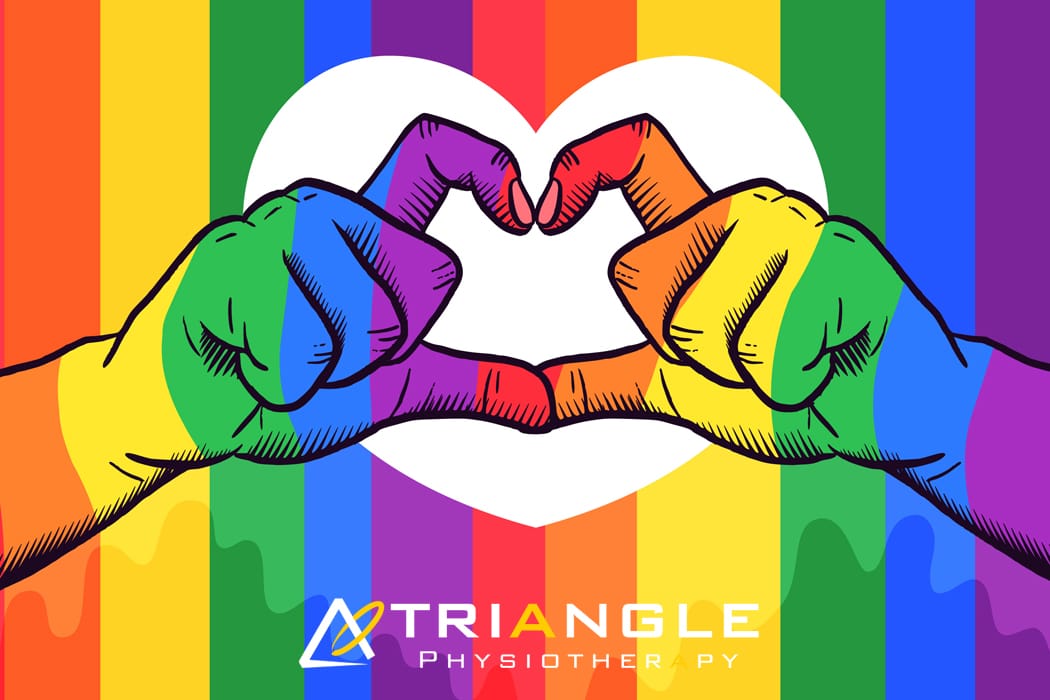
1.1. Equal Opportunities: We are committed to providing equal opportunities to all employees and clients, irrespective of their race, color, ethnicity, nationality, religion, gender, sexual orientation, age, disability, marital status, or any other protected characteristic.
1.2. Anti-Discrimination: Discrimination, harassment, or victimization of any kind will not be tolerated within our clinic. We actively promote a working environment that is free from any form of discrimination.
1.3. Accessibility: We strive to ensure that our clinic facilities, services, and information are accessible to all individuals, including those with disabilities. Reasonable accommodations will be provided to enable individuals to participate fully and equally in our programs and services.
1.4. Inclusive Culture: We foster an inclusive culture that values and respects individual differences. We encourage open dialogue, collaboration, and mutual respect among our employees, clients, and partners.
1.5. Training and Education: We will provide regular training and educational opportunities to our employees to enhance their understanding of diversity, inclusion, and unconscious bias. This will enable them to create an inclusive environment and deliver culturally competent care to our diverse client base.
2. Human Rights
2.1. Human Rights Compliance: We are committed to upholding and promoting human rights as defined by international conventions and local laws. We will not engage in any activities that violate human rights or support organizations or entities that do not align with our human rights principles.
2.2. Privacy and Confidentiality: We respect and protect the privacy and confidentiality of our clients’ personal information in accordance with applicable privacy laws and regulations.
2.3. Ethical Practices: We adhere to ethical business practices and will not engage in any form of exploitation, forced labor, child labor, or any activity that violates basic human rights.
2.4. Reporting Mechanisms: We encourage employees, clients, and other stakeholders to report any concerns related to equality, diversity, inclusion, or human rights violations. We will establish confidential reporting mechanisms and ensure that appropriate actions are taken to address reported issues.
2.5. Continuous Improvement: We are committed to continuously improving our policies, practices, and procedures to ensure that we remain aligned with evolving societal norms, best practices, and legal requirements related to EDI and human rights.
This policy applies to all employees, contractors, clients, visitors, and anyone associated with Triangle Physiotherapy. Violation of this policy may result in appropriate disciplinary action, up to and including termination of employment or termination of client relationship.
We believe that by actively promoting equality, diversity, inclusion, and human rights, we can create a positive and supportive environment that benefits everyone involved with our clinic.
Triangle Physiotherapy remains committed to reviewing and updating this policy periodically to ensure its relevance and effectiveness.
“At Triangle Physiotherapy, we are committed to Equity, Diversity, and Inclusion (EDI) and uphold human rights in all aspects of our services. We provide expert physiotherapy care across the GTA, including Physiotherapy in Etobicoke, Oakville, North York, Toronto, Lawrence Park, Queens Quay, Erin Mills, Mississauga, and Liberty Village. Our clinics are dedicated to creating an inclusive environment where everyone is treated with respect and dignity.”
A pessary is a medical device designed to be inserted into the vagina to provide support for pelvic organs or to treat certain gynecological conditions. It is typically made of silicone or plastic and comes in various shapes and sizes to accommodate different needs.
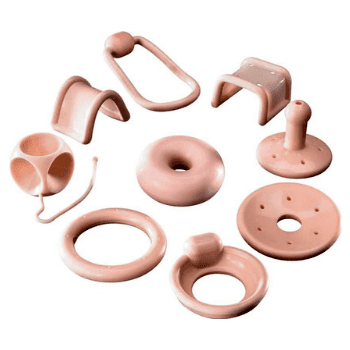
What is the purpose of a pessary?
The purpose of a pessary is to support the pelvic organs and alleviate symptoms of pelvic organ prolapse or urinary incontinence. It helps to hold the organs in place and improve their function.
Who might need a pessary?
Doctors commonly recommend pessaries for women who experience pelvic organ prolapse, which happens when the pelvic organs, such as the uterus, bladder, or rectum, descend from their normal positions. Pessaries can also manage stress urinary incontinence, a condition where involuntary leakage of urine occurs during activities that increase abdominal pressure, such as coughing or lifting.
How is a pessary inserted?
During a pelvic examination, a healthcare provider usually inserts the pessary. The healthcare provider folds the pessary and inserts it into the vagina. Once inside, the pessary opens up and provides support to the pelvic organs. The specific method of insertion may vary depending on the type of pessary being used.
How many appointments will I need?
Typically, you will require a minimum of three appointments to ensure that your pessary is doing what it needs to.
Do I need a doctor’s note to get fitted for a pessary?
No, you don’t need a doctor’s note to see the pelvic health physiotherapist, however, if your insurance requires one for reimbursement then you need to get one. Also if the therapist decides after assessing you, that you will benefit from a pessary then you will be provided with a clearance letter that will need to be signed by your family dr or your ob-gyn prior to fitting.
Are pessary fitting appointments covered by insurance?
Yes, the services are covered under physiotherapy coverage.
Does Triangle Physiotherapy do pessary fittings?
This service is currently provided at 4 of our locations in Toronto and Mississauga.
a. King West
c. North York
d. Mississauga
Who provides pessary fittings at Triangle Physiotherapy?
Some of our pelvic health physiotherapists at our Toronto Pessary Clinics and Mississauga Pessary Clinic are trained to do pessary fittings and insertions. Schedule an appointment to see if a pessary can help you.
How does the process work?
When you come in for your initial assessment, the therapist will do a pelvic assessment as well as take the measurement for the pessary. At your 2nd appointment, you will be fitted with a pessary device. You will have a follow-up appointment after 2-3 weeks to check if everything is ok and that there is no redness or infection. The pelvic physiotherapists will also explain to you how to take it out and clean it.
How can I find a pelvic health physiotherapist who does pessary fittings near me?
We have 4 locations with pelvic health physiotherapists that do pessary fittings to help you.
- Pessary Fittings North York – Triangle Physiotherapy North York
- Mississauga Pelvic Health, Mississauga Pessary Fitting – Triangle Physiotherapy Mississauga
- Toronto Pessary Clinic – Triangle Physiotherapy King West
- Uptown Toronto Pessary Clinic – Triangle Physiotherapy Lawrence Park
A pessary can be an effective non-surgical option for managing pelvic organ prolapse, and combining it with pelvic floor physiotherapy can enhance results. If you are looking for professional physiotherapy services to support your pelvic health, consider clinics in physiotherapy Etobicoke, Oakville, North York, Toronto, Lawrence Park, Queens Quay, Erin Mills, Mississauga, and Liberty Village. These locations offer specialized care and personalized treatment plans to help manage prolapse symptoms and improve quality of life.
Menopause can be a very overwhelming time for a lot of women. During this period, there are a lot of hormonal changes that can influence the way you feel in your body. Menopause tends to start between the ages of 45 to 55. This can include a range of symptoms such as hot flashes and mood swings to vaginal dryness and changes in pelvic health.
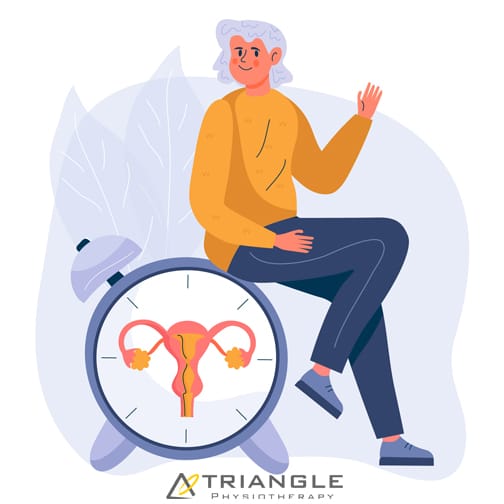
How does Menopause affect pelvic health?
Many women don’t realize that menopause can affect pelvic health. As estrogen levels decline, tissues in the vagina, urethra, and bladder can become thinner, drier, and less elastic, leading to a condition called vaginal atrophy. This can cause uncomfortable symptoms such as vaginal dryness, itching, burning, and pain during sex. In addition, menopause can also increase the risk of pelvic floor disorders, such as incontinence and prolapse. But don’t worry, many of these conditions can be improved through pelvic physiotherapy!
What is pelvic floor physiotherapy?
Pelvic floor physiotherapy is a specialized form of physiotherapy that focuses on the pelvic floor muscles, which support the pelvic organs (bladder, uterus, and rectum) and control bladder and bowel function. Pelvic physiotherapy can help to improve pelvic health during menopause and beyond, providing relief from uncomfortable symptoms and reducing the risk of pelvic floor disorders.
What does Pelvic Health Physiotherapy Involve?
Pelvic floor physiotherapy involves a range of techniques designed to improve the strength, coordination, and function of the pelvic floor muscles. These techniques may include pelvic floor exercises, biofeedback, electrical stimulation, manual therapy, and education on lifestyle modifications. It is an effective alternative to drug based therapy and surgery, and allows for you to take your health into your own hands.
How Can Pelvic Physiotherapy Help During Menopause?
- Pelvic physiotherapy can help to address a range of pelvic health issues that can arise during menopause, including:
- Vaginal Dryness: Pelvic physiotherapy can help to improve blood flow to the vaginal area, which can increase lubrication and reduce discomfort during intercourse. Additionally, exercises to strengthen the pelvic floor muscles can help to improve vaginal tone and elasticity.
- Urinary Incontinence: Pelvic physiotherapy can help to strengthen the pelvic floor muscles that support the bladder, which can improve bladder control and reduce urinary incontinence.
- Prolapse: Pelvic physiotherapy can help with prolapse symptoms or post-hysterectomy. With a prolapse, there is commonly increased muscle tone causing the organ to descend. This can be improved with exercise and treatment. Post hysterectomy, there can be pelvic floor weakness or altered sensation internally which can also be treated through strengthening and sensitization work.
- Painful Intercourse: Pelvic physiotherapy can help to improve vaginal tone and elasticity, which can reduce pain and discomfort during intercourse.
How can I find a pelvic health physiotherapist near me?
We have 8 locations with pelvic health physiotherapists to help you.
- Pelvic Health Physiotherapy Etobicoke – Triangle Physiotherapy Etobicoke
- Oakville Pelvic Health – Triangle Physiotherapy Oakville
- Pelvic Health Physiotherapy North York – Triangle Physiotherapy North York
- Mississauga Pelvic Health – Triangle Physiotherapy Mississauga
- Downtown Pelvic Health – Triangle Physiotherapy King West
- Uptown Toronto Pelvic Health – Triangle Physiotherapy Lawrence Park
- Pelvic Physiotherapy Downtown Toronto – Triangle Physiotherapy Queens Quay
- Mississauga Pelvic Health – Triangle Physiotherapy Erin Mills
“While menopause symptoms can be challenging, they are not inevitable for everyone and can be managed with the right care. Triangle Physiotherapy offers specialized services to help you navigate this stage of life across the GTA, including Physiotherapy in Etobicoke, Oakville, North York, Toronto, Lawrence Park, Queens Quay, Erin Mills, Mississauga, and Liberty Village. Our experienced team can provide personalized treatment plans to alleviate symptoms and improve your quality of life.”
What is vaginismus?
Vaginismus is a condition where the muscles around the vagina involuntarily contract, making it difficult or impossible to have vaginal penetration.
Do I have vaginismus?
If you answer yes to one or more of the following questions, you must book an appointment with a pelvic health physiotherapist to find out if you have vaginismus.
“Sex is so uncomfortable for me.”
“Why does it hurt to have sex? My doctor cannot find anything wrong with me.”
“Internal pelvic exams are a no for me – they are so painful.”
“My vagina feels like a fort that is impenetrable. I never realized it was vaginismus.”
“I used to have great sex, but now I close up—it burns and stings.”
“When my partner starts to move inside me, it hurts and we have to stop.”
“I don’t wear tampons because they don’t go in.”
What are the symptoms of vaginismus?
The symptoms may differ between younger and older women, emphasizing the significance of an accurate diagnosis and effective treatment for vaginismus.
The primary symptoms of vaginismus are:
- Sexual penetration seems physically impossible despite repeated attempts
- Difficulty inserting tampons from youth even after repeated attempts.
- Difficulty undergoing internal pelvic/gynecological exam
What are the causes of Vaginismus?

The exact causes of vaginismus can vary from person to person, and in many cases, the condition is multifactorial, meaning that multiple factors may contribute to its development. Here are some potential causes and contributing factors:
- Psychological factors: Emotional or psychological factors can play a significant role in vaginismus. Past traumatic experiences, such as sexual abuse, rape, or a history of painful intercourse, can contribute to the development of vaginismus. Anxiety, fear, guilt, or negative beliefs about sex can also trigger involuntary muscle contractions.
- Fear of pain or discomfort: Some individuals may develop vaginismus due to a fear of pain or discomfort during sexual intercourse. This fear can be based on previous painful experiences, cultural or religious beliefs, or misinformation about sex.
- Relationship issues: Difficulties in the relationship, such as poor communication, lack of trust, unresolved conflicts, or sexual problems, can contribute to the development or persistence of vaginismus. Emotional or physical distance between partners can create tension and anxiety during sexual activity.
- Cultural or religious factors: Cultural or religious beliefs and practices surrounding sex can influence a person’s perception of sexuality and contribute to the development of vaginismus. Upbringing that emphasizes guilt, shame, or negative attitudes towards sex can lead to involuntary muscle contractions during attempts at vaginal penetration.
- Lack of sexual education: Insufficient knowledge or understanding about sexual anatomy, arousal, and relaxation techniques can contribute to vaginismus. Inadequate sexual education may lead to misconceptions, anxiety, and fear surrounding sexual activity.
- Medical conditions or infections: Certain medical conditions, such as vaginal infections, urinary tract infections, endometriosis, or pelvic inflammatory disease, can cause pain during sex, leading to the development of vaginismus. Vaginal dryness or atrophy, often associated with menopause, can also contribute to discomfort and muscle tightness.
- Traumatic childbirth experiences: Some women may develop vaginismus after experiencing a traumatic childbirth, especially if they had a difficult or painful delivery. The association of vaginal penetration with the traumatic event can trigger involuntary muscle contractions.
What are the treatment options for vaginismus?
Pelvic health physiotherapy is a common treatment option for vaginismus. It involves a physical therapist working with the patient to help relax and strengthen the pelvic floor muscles.
Possible treatments include:
- Progressive pelvic floor muscle relaxation
- Biofeedback or muscle stimulation
- Yoga-based therapy
- Hip mobility work
- Lumbar spine mobility work
What can I expect during an assessment and treatment for vaginismus at Triangle Physiotherapy?
Assessment
The first step in pelvic health physiotherapy for vaginismus is usually an assessment of the patient’s pelvic floor muscles. This may involve an internal examination, but the therapist will always seek the patient’s consent and respect their comfort level.
Treatment
Once the assessment is complete, the therapist will develop a treatment plan tailored to the patient’s needs. This may involve exercises to strengthen the pelvic floor muscles or techniques to help the patient relax those muscles.
Techniques
One common technique used in pelvic health physiotherapy for vaginismus is called progressive muscle relaxation. This involves tensing and then releasing the pelvic floor muscles in a controlled way to help the patient become more aware of them and learn how to control them.
Another technique that may be used is biofeedback. This involves using sensors to monitor the activity of the pelvic floor muscles, which can help the patient learn to control them more effectively.
Overall, pelvic health physiotherapy can be an effective treatment for vaginismus, but it is important to work with a qualified physical therapist who has experience in this area. With patience, persistence, and the right guidance, many people with vaginismus can overcome their condition and enjoy fulfilling sexual relationships.
How do I find a pelvic health physiotherapist near me?
We have 8 locations with pelvic health physiotherapists to help you. Book an Appointment today!
- Pelvic Health Physiotherapy Etobicoke – Triangle Physiotherapy Etobicoke
- Oakville Pelvic Health – Triangle Physiotherapy Oakville
- Pelvic Health Physiotherapy North York – Triangle Physiotherapy North York
- Mississauga Pelvic Health – Triangle Physiotherapy Mississauga
- Downtown Pelvic Health – Triangle Physiotherapy King West
- Uptown Toronto Pelvic Health – Triangle Physiotherapy Lawrence Park
- Pelvic Physiotherapy Downtown Toronto – Triangle Physiotherapy Queens Quay
- Mississauga Pelvic Health – Triangle Physiotherapy Erin Mills
“Managing vaginismus and improving intimacy is possible with the right physiotherapy care. Triangle Physiotherapy offers specialized pelvic health services across the GTA, including Physiotherapy in Etobicoke, Oakville, North York, Toronto, Lawrence Park, Queens Quay, Erin Mills, Mississauga, and Liberty Village. Our experienced physiotherapists can help you overcome pain and enhance your intimate relationships through personalized treatment plans.”
Written by Roshni Ravi, Pelvic Health Physiotherapist.
Sexual health is an important aspect of overall health and well-being, but it’s not always an easy topic to talk about. Many women experience sexual health dysfunctions at some point in their lives, but they may feel embarrassed or ashamed to seek help by way of pelvic floor physiotherapy. There are currently large gaps in the sexual education provided at the elementary school level. Many sex ed classes are focused on birth control and how terrible periods are.
But there is not enough information, if any, on sexual health conditions and how to seek help. We’ve had a lot of conversations with patients about what they wish they had learned in sex-ed. In this blog post, we’ll explore some of the most commonly asked questions about sexual health dysfunctions in women and offer some tips for managing them.
What is pelvic floor physiotherapy?
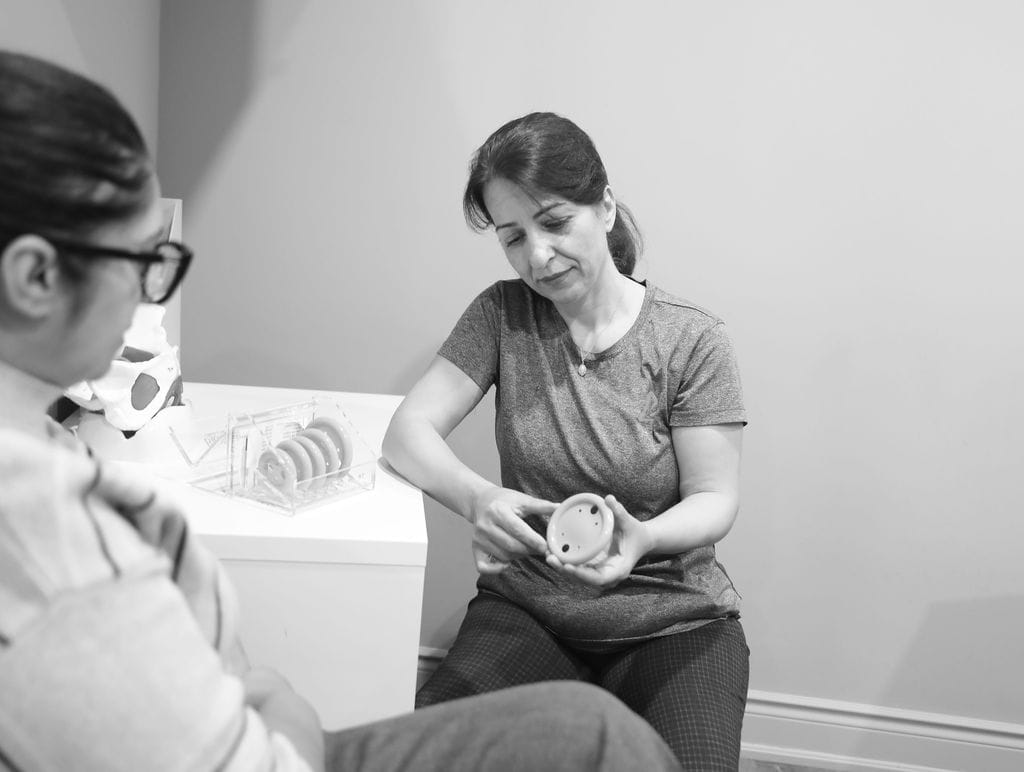
Pelvic floor physiotherapy focuses on treating the muscles, ligaments, and connective tissues of the pelvic floor which is a group of muscles that form a supportive hammock-like structure at the base of the pelvis. They play a key role in maintaining continence, supporting the pelvic organs, and providing stability to the spine and hips.
Pelvic floor physiotherapy involves a range of exercises, manual therapy techniques, and education to help individuals with pelvic floor dysfunction. Common conditions that may benefit from pelvic floor physiotherapy include:
- urinary and fecal incontinence,
- pelvic pain,
- pelvic organ prolapse, and
- sexual dysfunction.
Why am I suffering from a low libido? Can pelvic floor physiotherapy help?
Many women experience a decrease in sexual desire at some point in their lives. This can be caused by a variety of factors, including stress, hormonal imbalances, and relationship issues. To manage low libido, it’s important to address any underlying issues and make self-care a priority. This can include:
- practicing stress-management techniques,
- getting enough sleep, and
- engaging in regular exercise.
Why does it hurt to have sex?
Painful intercourse, also known as dyspareunia, is a common sexual health dysfunction in women. It can be caused by a variety of factors, including vaginal dryness, infections, and hormonal imbalances. To manage painful intercourse, it’s important to work with a healthcare provider to identify the underlying cause and develop a treatment plan. This may include using:
- lubricants,
- treating infections,
- or using hormonal therapy.
I struggle to orgasm during sex, why does that happen?
Many women struggle to achieve orgasm during sexual activity which can be caused by a variety of factors, including, stress, relationship issues, and hormonal imbalances. To manage orgasmic dysfunction, it’s important to work with a healthcare provider or therapist to address any underlying issues and develop strategies for improving sexual function. This may include:
- practicing mindfulness or
- engaging in self-exploration techniques.
My vagina feels like a fort that is impenetrable. Why can I not have sexual intercourse?
Vaginismus is a condition in which the muscles of the vaginal wall contract involuntarily, making intercourse difficult or impossible. It can be caused by a variety of factors, including past trauma and anxiety. To manage vaginismus, it’s important to work with a healthcare provider or therapist to address any underlying issues and develop strategies for managing anxiety and relaxing the pelvic floor muscles.
What is vulvodynia? Do I need pelvic floor physiotherapy?
Vulvodynia is a chronic pain condition that affects the vulva, or external genitalia. It can cause burning, stinging, or itching sensations, and can make sexual activity painful or uncomfortable. To manage vulvodynia, it’s important to work with a healthcare provider to identify the underlying cause and develop a treatment plan. This may include:
- using topical creams or medications,
- practicing relaxation techniques, or
- seeing a pelvic health physiotherapist.
Help! I pee my pants!

Urinary incontinence is a common condition in which urine leaks from the bladder involuntarily. It can be caused by a variety of factors, including hormonal changes, pregnancy, and pelvic floor dysfunction. To manage urinary incontinence, it’s important to work with a healthcare provider or pelvic floor physiotherapist to develop a treatment plan. This may include:
- pelvic floor exercises,
- bladder training, or
- medications.
What are the signs of menopause?
Menopause can cause a variety of changes in sexual function, including vaginal dryness, decreased libido, and painful intercourse. To manage these changes, it’s important to work with a healthcare provider to develop a treatment plan. This may include:
- using hormonal therapy,
- vaginal moisturizers, or
- engaging in regular sexual activity to maintain pelvic floor health.
Where can I find a pelvic health physiotherapist near me?
We have 8 locations with pelvic health physiotherapists to help you.
- Pelvic Health Physiotherapy Etobicoke – Triangle Physiotherapy Etobicoke
- Oakville Pelvic Health – Triangle Physiotherapy Oakville
- Pelvic Health Physiotherapy North York – Triangle Physiotherapy North York
- Mississauga Pelvic Health – Triangle Physiotherapy Mississauga
- Downtown Pelvic Health – Triangle Physiotherapy King West
- Uptown Toronto Pelvic Health – Triangle Physiotherapy Lawrence Park
- Pelvic Physiotherapy Downtown Toronto – Triangle Physiotherapy Queens Quay
- Mississauga Pelvic Health – Triangle Physiotherapy Erin Mills
In conclusion…
Many women experience sexual health dysfunctions at some point in their lives, but they may feel embarrassed or ashamed to seek help. It’s important to remember that sexual health is an important aspect of overall health and well-being, and it’s important to prioritize it in your self-care routine. If you’re experiencing any issues related to sexual function, don’t hesitate to talk to your healthcare provider or a therapist about your options. Remember, there is help!
Click here to book your consultation with one of our knowledgeable and compassionate pelvic health physiotherapists.
“Pelvic floor physiotherapy is essential for improving sexual health and overall well-being. Triangle Physiotherapy offers specialized pelvic health services across the GTA, including Physiotherapy in Etobicoke, Oakville, North York, Toronto, Lawrence Park, Queens Quay, Erin Mills, Mississauga, and Liberty Village. Our experienced team can help you address pelvic floor issues and enhance your sexual health through personalized treatment plans.”
Pelvic Floor Physiotherapy refers to a specific and advanced field within physiotherapy that deals with Pelvic Floor Dysfunction. Pelvic Floor Dysfunction can impact people of any age or gender and the term describes several conditions that may affect the urinary, reproductive, digestive, sexual, and/or stability systems in the pelvis.
Pelvic Health Physiotherapists have post-graduate training in pelvic health and can resolve many pelvic floor issues in people of all genders and ages.
What type of conditions can Pelvic Floor Physiotherapy help women with?

Pelvic Health physiotherapists at our clinics can help women with the following:
- Pelvic floor and abdominal weakness
- Bladder and bowel problems
- Pelvic pain (endometriosis, bowel, bladder pain)
- Pelvic organ prolapse (POP)
- Sexual dysfunction, vaginismus, painful intercourse
- Prenatal and postnatal care
- Diastasis Recti
- Labour and delivery prep
Can a pelvic health physiotherapist help men?

Pelvic Health physiotherapists at our clinics can help men with the following:
- Pelvic pain
- Bladder and bowel control problems
- Erectile dysfunction
- Pre and post-prostatectomy
Can your pelvic health physiotherapists help transgender individuals?
Yes, our pelvic health physiotherapists can certainly help transgender individuals.
- Surgical preparation and recovery post-surgery
- Pelvic pain – Endometriosis or PCOS
- Intimacy pain, difficulty with penetration
- Pregnancy and postnatal care for Trans-parents
Pelvic Floor Assessment – what does it entail?
Your first appointment will last about an hour. Your pelvic health physiotherapist will discuss your medical history, do a thorough pelvic health assessment and propose a detailed individualized treatment plan to achieve your pelvic health goals. The assessment may include an internal examination, with your consent, of course, depending on your condition.
Triangle Physiotherapy and our pelvic health team are passionate about supporting our transgender and intersex community.
What should I bring to my appointment? What should I wear?
Make sure you have filled out the Health Questionnaire sent to you by our booking team. Bring any physician or specialist referrals to test results you may have. Please wear comfortable clothing, there are no specific requirements.
How many sessions will I need?
After your assessment, your physiotherapist will prepare a treatment plan for you and be able to indicate how many appointments you may need to achieve your pelvic health goals.
Can I attend my appointment if I have my period?
Your pelvic health physiotherapist can treat you while you have your period, as long as you are comfortable with it.
How do I book an appointment to see a pelvic health physiotherapist at Triangle Physiotherapy?
Triangle Physiotherapy has pelvic health physiotherapists at the following locations:
- Etobicoke Pelvic Health – Triangle Physiotherapy Etobicoke
- Mississauga Pelvic Health – Triangle Physiotherapy Mississauga, Triangle Physiotherapy Erin Mills
- North York Pelvic Health – Triangle Physiotherapy North York
- Toronto Pelvic Health – Triangle Physiotherapy King West, Triangle Physiotherapy Queens Quay, Triangle Physiotherapy Lawrence Park
- Oakville Pelvic Health – Triangle Physiotherapy Oakville
Pelvic floor physiotherapy is essential for managing pelvic health issues such as incontinence, pelvic pain, and postpartum recovery. If you are seeking expert physiotherapy services to improve your pelvic health, there are clinics in physiotherapy Etobicoke, Oakville, North York, Toronto, Lawrence Park, Queens Quay, Erin Mills, Mississauga, and Liberty Village. These locations offer specialized care and personalized treatment plans to help you achieve optimal pelvic health and well-being.






